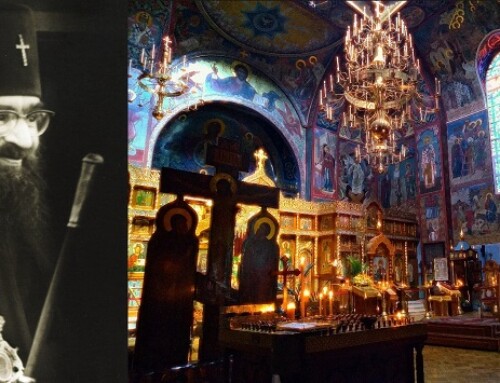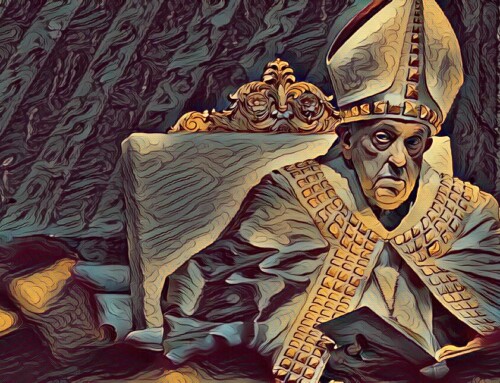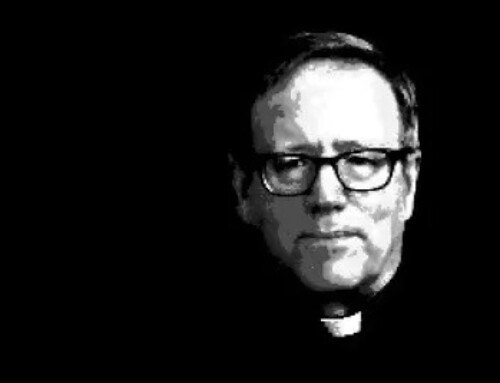“Father asks to have it passed on to all who have remained loyal to him and to those on whom they might have influence, that they not avenge him; he has forgiven and prays for everyone; and not to avenge themselves, but to remember that the evil which is now in the world will become yet more powerful, and that it is not evil which conquers evil, but only love.” – Czar Nicholas II (From a letter written by his eldest daughter, Grand Duchess Olga.)
“If the Holy Spirit is peace of soul, as He is said to be and as He is in reality, and if anger is disturbance of heart, as it actually is and as it is said to be, then nothing so prevents His presence in us as anger.” – St. John Climacus, “The Ladder of Divine Ascent”
I think I have spent much of my life being angry. Angry at everyone: with my father; the other boys at school; the Church; the world; with myself; and with God. At first, I didn’t know why I was angry. By the time I was a teenager – I thought I understood. I was tired of feeling alone; of being bullied; of always getting left-out. I wanted to belong. Then, I thought I found the answer to all my furtive prayers: I am gay. Almost immediately, I thought I had a purpose and an identity. This revelation hit me like the words of God to Moses in one of my favorite childhood films, “The Ten Commandments,” when the “burning bush” said: “I am Who I am.” He made me this way. Once I graduated from high-school, I set out for San Francisco – thinking that I would be set free.
Yet, when I arrived, the so-called promised land was in the midst of a plague. I was scared, but I didn’t care – I would rather live one day here than 100 years in my old life. But I lived more than one day. And eventually – that became too much. I wanted to die. I thought my anger had returned, only it never really went away. I had masked my pain with pseudo-pleasure. Reenacting the abuse. Every older man that I met – stood-in for my abuser. At the same time, I saw countless others doing the same thing. Misery loved company – until I was miserable. I was in hell.
Yet, I never contemplated leaving. I imagined that one day I would reach some magical threshold of confirmation when I could gain my ultimate goal – manhood; as if some other man could bestow it upon me through sex. I sometimes believed that I was in the middle of a journey; as a result, many of my fellow pilgrims never realized (like myself) that are earlier experiences of grooming and sex with older men – was actually abuse. In our minds, those instances were merely part of the process.
“Your eyes are full of hate…
That’s good. Hate keeps a man alive.
It gives him strength.” – Quintus Arrius, “Ben-Hur”
I didn’t want to live this way. And, I didn’t want to die that way either. Alone and scared. I sought help. Sometimes I found it. Sometimes I didn’t. I returned to the Roman Catholic Church. I wasn’t sure why, but I knew I had unfinished business there. It was strange, thinking back – I am reminded of a wonderful scene in the 1959 film version of “Ben-Hur.” After his imprisonment and later escape, Judah Ben-Hur is brought to Rome and (although this is not particularly evident in the film) becomes distracted by the decadence of the Roman Empire. Then, he returns to his birthplace of Judea. On the ship – still miles away from land, he can smell the scents of home. On shore, he lays under the shade of a palm tree, pours water over his face, and smiles with contentment – for the first time in many years. Within a few seconds – the world rushes back in. One of the “Wise Men,” a now aged Balthazar, is looking for the adult Jesus; he thinks Judah might be Him. Later that day, he is confronted with the name of the man who betrayed him – Messala. His moment of peace is over. I felt the same way – because, as I almost literally walked through the Church doors: the predators awaited. I had no peace. It was like being Dorothy in “The Wizard of Oz,” newly arrived in the Emerald City, and looking up into the sky and exclaiming: “It’s the witch! She’s followed us here!”
Over the next twenty years, I tried to live in the same house with my abusers. Seemed as if I were residing in Jonestown. I couldn’t leave. Where would I go? Out into the darkness of the surrounding jungle? But I didn’t really want to run away. Because my savior was also my tormentor. As a faithful member of the cult, I should submit to such abuse. It was a form of self-purification. It was through such a process of suffering that future martyrs and saints were made.
Theoretically, through such suffering – one would grow closer to God. Sometimes, it seemed as if I were in a BDSM relationship; my submission and stripping of the will were essential to redemption. Such perversion of Christian renunciation was often used to justify the institutional abuse of Catholic mystics and reformers as St. John of the Cross and Padre Pio. But this ill-treatment and cruelty from within your own religion was nothing new to Christianity; for Christ Himself was betrayed by His own people and His own apostles. But in that case, the secular authorities (the Romans) were the ones to literally drive the nails into His hands and feet. In Catholicism, the Church itself struck me.
But I didn’t leave. I just got angry. Suddenly, the transference of my anger moved from that of my oppressors – to God Himself. I started to believe that I was losing my faith. And my mind. If I left the Roman Catholic Church, I thought that meant I was turning away from God. I started to hate Him – and for me – that was unbearable. I thought that He destined me for a lifetime of abuse, in the same way he made me to be gay – and then banished me to a lonely existence of isolation and unmet longings for love. But He didn’t create me for abuse and He didn’t make me gay. The abuse caused (or at least contributed to) my later manifestation of homosexuality. Continued and repeated abuse in both the Church, and the gay male community, subconsciously normalized past trauma – and consequently kept me from recognizing it.
Once I figured that out, I knew that I had to walk away – for my own sake. Only, I took with me – anger. At times it was uncontrollable. I wanted it gone, because I knew that it was killing me, but I also thought that my survival depended upon its retention. I needed it. Anger kept me alert. It kept me safe. It kept me alive. Anger prevented my further manipulation and abuse.
“Revenge should have no bounds.” – Hamlet
Psychiatrists label these sort of thoughts as “blocking beliefs.” Perhaps the most famous example comes from William Shakespeare’s “Hamlet.” Even before the appearance of his murdered father’s ghost, Hamlet is seething with anger and contempt towards his mother and uncle who married not long after his father’s death. After the ghost tells him the truth about his death, Hamlet sets upon his quest for revenge – fueled by anger and hatred. In his mind, vengeance will make everything right again. The comic-book character of Batman is a modern version of the Hamlet story, with Batman seeking retribution for the murder of his father and mother – which he witnessed as a boy. The greatest cinematic realization of Batman’s adherence to “blocking beliefs” occurs in “The Dark Knight Trilogy” of films. The subterranean “bat-cave” represents the traumatic memories of his parent’s death that still replay vividly in the recesses of his mind. Later, that initial trauma is exacerbated by further pain incurred during the process of futile self-healing through abuse-reenactment and revenge. As the story goes on, and the body count rises, everything just keeps getting darker.
Another recent manifestation of a fictional character enslaved by “blocking beliefs” is Paul Atreides in “Dune.” But my favorite example is Lieutenant Worf from the TV-series “Star Trek: The Next Generation.” The only Klingon aboard the Enterprise – Worf was orphaned as a boy and raised by human parents on Earth. Like Mr. Spock, he is sometimes torn between the world of humanity and his own divergent heritage. While emotions are something to be controlled for Mr. Spock, in Klingon culture – even in their most primal form, such as hate, anger, and vengeance, such thoughts are to be greatly valued and immediately acted upon. And Worf has much to be angry about: his father was falsely accused of treason and thus his entire family-name is disgraced; he is shunned by most Klingons; the mother of his son is murdered. Consequently, Worf is sometimes prone to violent outbursts of anger. But he remains a highly moral, ethical, and honorable man. He chooses to cover-up the actual circumstances of his father’s “shame,” in order to save the Klingon Empire from possible civil-war and dissolution. Also, after Worf and the mother of his child have a sexual encounter – he insists on their “marriage.” She refuses. After her death, his son comes to live with him on the Enterprise when his human grandparents can no longer manage him. But Worf’s relationship with his more sensitive son (his mother was half-human) remains strained through much of the story arc.
“No other life is possible except to wash this land clean…in blood!” – Judah Ben-Hur, “Ben-Hur”
As evidenced by Worf, anger when combined with the masculine-warrior-spirt can be a quality that assists in prompting action and justice. When its out-of-control, a blood-bath, self-destruction, or madness can be the result. At the dawn of student-protests and civil unrest throughout much of the Western world, this burgeoning anger first materialized in the violent Spaghetti-revenge-westerns of the 1960s. And like James Dean in “Rebel Without a Cause” became an inspiration to rebellious teens in America, the violent philosophies of Karl Marx motivated the angry and traumatized young men of Czarist Russia – including Vladimir Lenin, Leon Trotsky, and Joseph Stalin whose anger were instilled within them by the execution of a brother, their own exile to Siberia, and the vicious beatings of a drunken father. And when these angry men took power over millions, they unleashed a torrent of suffering and sadism that outdid anything the Romanovs could imagine.
Childhood trauma can wreak havoc on an entire life – and upon those around the affected person. My favorite example is that of Ebenezer Scrooge in Charles Dickens’ “A Christmas Carol.” Abandoned by his sullen father at a gloomy public school, the young Ebenezer’s lone link to compassion and love is his devoted sister. When she dies young in childbirth – he closes everything off; except greed and disgust for humanity. Consequently, everyone in his orbit suffers – his sole nephew, his underpaid and abused clerk, and all those who owe him money. Not until he is faced with the inescapable ramifications of his hatred does Ebenezer have a change-of-heart. Like Saint Paul, his conversion is almost instantaneous. But this required both of them to say: Yes. And in the case of Ebenezer, to cease his own imprisonment in perpetual victimhood.
“We cannot have a world where everyone is a victim. ‘I’m this way because my father made me this way. I’m this way because my husband made me this way.’ Yes, we are indeed formed by traumas that happen to us. But then you must take charge, you must take over, you are responsible.” – Camille Paglia
The ultimate trajectory for most revenge fantasies is self-annihilation or genocide. Recent history is filled with the horror-stories of mainly disaffected and angry young men who coalesce into groups and then cause great damage upon innocent bystanders – from the “Brown Shirts” to today’s intersectional-identity warfare. People are lost and filled with hopeless. Particularly men, feel as if they have been left-behind and abandoned; by the increasingly female-dominated educational system; by the modern service economy; by their fathers; and by God. Yet, the shot-gun blast size hole in our chest (that you can see through) doesn’t close due to hatred or revenge – it just gets bigger. As Ben-Hur discovered – the death of his mortal enemy, the man he dreamed for five years about killing, fails to bring him consolation. He only grows angrier. Then, he wants to drench the world in blood. However, for those who have gone down that path, eventually – the world is not enough.
I used to be like “Mr. Smith Goes to Washington.” I was abused, broken, but naive. I was instinctively mistrustful, but I wanted to trust someone. At a local Catholic parish, I saw a large image of a handsome and caring looking Jesus with the words “Jesus, I Trust in You” emblazoned under His feet. Like someone who had been in one too many bad and abusive romances, I thought I could love again. I thought I could trust again. I got abused. Again. A few years later, whatever lingering naiveté that I still retained was gone. Then, I thought I could change the Roman Catholic Church. I thought I could reform it. For the better. And so, no one else who have to be abused. I thought my rage would be my strength. But I banged my brain against a wall for 20 years. The only thing that changed – was me. I was always angry and hateful, but those emotions started to take over. Like Mr. Spock, sometimes I could not sublimate my emotions any longer. And like Lieutenant Worf – I had made a weird bargain, to keep silent for the greater good of an institution that I still believed in. But as the Klingon Empire had degraded into a circus of mediocrity and corruption, I finally realized that the only thing I was protecting were the evil-doers; and, as a result, allowing them to continue in their crimes.
As for my anger and hatred. It’s still there. But I often choose to be angry. And to be triggered. Though sometimes it’s impossible to avoid. Yet, I don’t want live as an emotionally-repressed zombie. In order to “live-with” my anger, I have been edified by the example of Czar Nichols II. Despite his failings as a human being and as a political leader, his commitment to his family and Nichols’ behavior during his imprisonment (along with his wife, children, and a few devoted attendants) was completely exemplary. Following the abdication of Nicholas, and the events surrounding the February Revolution of 1917, the Russian Imperial family was essentially under house arrest until their brutal murder on July 17, 1918 by the Bolsheviks. Specifically, after the family was transferred to the Siberian backwater town of Tobolsk – their living conditions became increasingly spartan. During the harsh Siberian winter, the family froze. But they never complained. Instead, Nicholas and his daughters (sometimes accompanied by his sickly hemophiliac son Alexi) busied themselves inside their outdoor walled enclosure: endlessly chopping wood, sledding down a snow hill that they created, or simply walking silently in a circle. The revolutionary guards at Tobolsk, even began to sympathize with the family – especially with the former “tyrant” Nicholas. Consequentially a sort of leniency developed in terms of the circumstances surrounding their imprisonment – with the greatest privilege being that the family was allowed to make a short walk to the local Russian Orthodox temple in order to attend Sunday liturgy. Back in their living quarters, their most prized possessions were a few religious books (which they read aloud to each other over and over again) and their icons.
I am reminded of the lyrics from Coldplay’s masterful “Viva La Vida;” about a man who literally “ruled the world” and then is reduced to sweeping the streets. Despite their worsening treatment by the murderous and psychotic Bolshevik retinue of guards, after the family is moved to the Ural industrial city of Yekaterinburg, Nicholas remained hopeful.
The lesson I learned – oftentimes our circumstances are completely out-of-control. We cannot reimagine the past. But we can choose what we do today. And I have chosen to no longer be a victim. A big part of that decision included leaving the Roman Catholic Church. Because the Church required my perpetual victimhood – until death. Instead, I chose to have hope. Hope in defeat. Alexander Solzhenitsyn wrote: “When [a man] has been taken and destroyed, when he has nothing more to lose, and is, in consequence, ready and eager for heroic action, his belated rage can only spend itself against the stone walls of solitary confinement.” Roman Catholics are imprisoned within the walls of obedience. They must be silent. If you disparage in any way the human beings who rule the institution, you are criticizing the spotless “Bride of Christ” – in their reality, you are guilty of betraying God. Many Roman Catholics will also argue that those in the Church are completely separate from the Church itself. However, if you leave the institution, you are turning your back on Christ. As one Roman Catholic commentator expressed: ” When a Catholic leaves the Church because he is scandalized by heresy, sexual abuse, and the like, this is like fleeing the scene when one’s mother is being attacked, lest one suffer harm oneself. It is to abandon Holy Mother Church, the Bride of Christ, to the heretics and perverts, rather than to aid her against them and to suffer with her while they assail her.” In other words, no matter who they are, you must stay with those who rape, beat, and lie to you – because you are ultimately responsible for the salvation of your abusers. When it’s an institution, like a sadistic abuser who repeatedly tells you: You can’t leave me; or, Where will you go? it’s scary to leave, but, for me, I knew my life depended on it. I am willing to suffer and die for Christ, but not for Judas. Unlike Nicholas II – whose faith remained a constant source of hope – my own church tried to destroy me. They left me hopeless. And, to live without hope is to be in hell.
“One must by every means strive to preserve peace of soul and not be disturbed by offenses from others; for this one must in every way strive to restrain anger and by means of attentiveness to keep the mind and heart from improper feelings. And therefore, we must bear offenses from others with equanimity and accustom ourselves to such a disposition of spirit that these offenses seem to concern us, but others. Such a practice can give quietness to the human heart and make it as dwelling for God Himself.” – St. Seraphim of Sarov






“When a Catholic leaves the Church because he is scandalized by heresy, sexual abuse, and the like, this is like fleeing the scene when one’s mother is being attacked, lest one suffer harm oneself. It is to abandon Holy Mother Church, the Bride of Christ, to the heretics and perverts, rather than to aid her against them and to suffer with her while they assail her.”
That’s seriously messed up. This is the worst anxiety of people who have lived in abusive relationships with siblings or friends, and had to choose between staying there with their loved ones, whom they’ve begged to leave with them, or go, and hope for the best. That is a fear and guilt that never leaves, and it seems cruel to inflict the responsibility on the victim that left rather than the abuser.
I could say more, but that is a sensitive topic personally, and I blunder my way into stupidity enough in my writing. That’s a terrible analogy to use.
I know people who stayed in abusive home with mothers or sibling who were being abused, and were terribly abused themselves. The abuser pits them against each other, showing favoritism to some with less abuse if they heap it on the scapegoat[s], so their victims don’t band together against them. If they stay, they grow into resentful adults against the parent that didn’t protect them, and the siblings who turned on them.
If they leave, they live with guilt over it the rest of their lives, with those that stayed resenting them for leaving, and they resenting their siblings and themselves because they fear they failed, and are angry for being blamed.
The person who hurt them in the meantime, while hated, is sort of relegated to a dark corner and given less attention, though that person was the real perpetrator of the harm.
It’s sick.
Anyways, that’s enough writing.
Question for clarification: Joseph are you leaving Catholicism? I hope and pray the answer is no. I will pray for you. There are all sorts of traps to discourage us to feel hopeless about seeing any real solution. The entire Mystical Body of Christ is in this whether they understand or not. The ultimate confrontation with the Church and the anti-Churc, is according to Sr. Lucia of Fatima going to be about marriage and the family. I hope you can see the big picture and the big battle that is nearing on the horizon. Contitnue to pray for the Triumph of the Immaculate Heart of Mary. Use your anger for the good– pray harder and find good Catholics who will pray and give you support. The devil would love for you to leave the Church. Don’t fall for the trap.
Left. Very happy with the Russian Orthodox Church. But thank you for the prayers. We all need them.
There is the institution of the Catholic Church and being a Catholic. Alice von Hildebrand testified to the smoke of Satan present in the Vatican. Currently, the institution acts in an evil manner, led by Bergoglio and his cadre of homosexuals or homosexualists. Each human being has their own tolerance for dealing with toxic and evil environments. Joseph needs to heal and experience a thousand memories of the beauty of healthy Christian community. Remember, he stayed in the toxic swamp of California for many years. Would you be able to fight his fight and do the same?
Welcome Joseph.. We all need healing. God bless you.
Thanks for clarifying, Joseph. Yes, you are so right. We all do need prayers. May God bless you always.